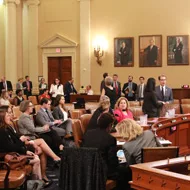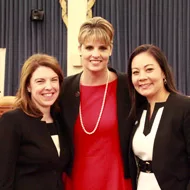 As women business owners, it would be unthinkable to let others make decisions about our businesses who have never walked in our shoes and have no knowledge about what it takes, what challenges keep us up at night and what opportunities we dream about—and it’s no different with the people who influence and make public policy decisions that have a profound impact on our businesses.
As women business owners, it would be unthinkable to let others make decisions about our businesses who have never walked in our shoes and have no knowledge about what it takes, what challenges keep us up at night and what opportunities we dream about—and it’s no different with the people who influence and make public policy decisions that have a profound impact on our businesses.
That’s why NAWBO National Past Chair Teresa Meares eagerly accepted a recent invitation to speak out on behalf of her NAWBO sisters and women business owners everywhere to the U.S. House Committee on Ways and Means Subcommittee on Tax Policy by sharing her thoughts and experiences with tax policy and how it can help America’s small businesses grow and create new jobs. Below is Teresa’s testimony that she gave in mid July and that landed her an invite to appear on Fox Business to speak more about how tax reform could help today’s small businesses.
Thank you Chairman Roskam, Ranking Member Doggett and all the Members of the Committee on Ways and Means Subcommittee on Tax Policy for hosting this hearing on such an important topic and one very close to my heart—How Tax Reform Will Help America’s Small Businesses Grow and Create New Jobs. It is an honor to appear before you today.
My name is Teresa Meares. It is my pleasure to be here with you today to share my experiences. I am a small business owner two times over, the mother of a 13-year-old small business owner and on July 1, I completed my yearlong tenure as Chair of NAWBO, the National Association of Women Business Owners, where we are proud to represent the 10-plus million women-owned businesses in this country. NAWBO was founded in 1975 to serve as the first advocacy organization for all women business owners. Today, we are proud to continue that legacy and represent one of the fastest growing segments of the economy, women business owners. NAWBO is the only dues-based organization representing the interests of all women entrepreneurs across all industries and with chapters across the country. With far-reaching clout and impact, NAWBO is a one-stop resource to propelling women business owners into greater economic, social and political spheres of power worldwide.
My company, DGG Uniform and Work Apparel, is a growing company where in the last six months I have hired five new employees, two of whom are Veterans, two of whom were unemployed and one of whom was about to be unemployed. We operate as an LLC and file as an S-Corp.
Before I get into the details of my current company and experience as the Chair for NAWBO, please allow me to provide you with a little history on myself and my business experience. I am a retired law enforcement officer from Florida, where I spent 20 years serving my community. In 2006, I bought an exclusive distributorship for certain law enforcement products. I obtained the capital through an SBA 7a loan and I purchased two business condos with an SBA 504 loan. My husband and I used our retirement savings for the down payment and for capital to grow our company.
We quickly grew our company and when we expanded our product line in 2007, we made over $1 million in revenue within the first year. We went from one employee to 28 within two years and within five years we had grown our revenue to more than $15 million. While we were pleased to see the company expand, the initial capital of our retirement was in no way enough to support our immediate and rapid growth. We already had the SBA loans to start, so cash was hard to come by and we had to try and self-fund our growth. We survived, but it was not easy.
Last year, I was fortunate enough to sell that company and I launched a uniform and clothing line. We again have experienced fast growth and although I am determined to apply the lessons from the last 10 years and not repeat them to grow at a more controlled pace, I need to have the ability to support this growth. Tax reform focused on allowing small businesses to keep more cash in our companies is a place to start.
As I grow this business, some things that affected me with my previous venture are on my mind. There were roadblocks that took cash out of my business, hurt my cash flow and stunted my growth.
The complicated nature of the tax code led to misunderstandings and confusion. I lacked the ability to understand or use certain deductions in order to generate cash back into my company. As a result, I overpaid in taxes during those critical years when I needed cash flow to support the growth in my company. When I finally stopped and questioned why I had no cash, while having to pay so much back out, I had to spend $20,000 in legal and CPA fees to understand if I could or could not use certain items as a tax deduction. As a small business owner, I do not have the resources for expensive tax attorneys to guide me each year or the ability to have multiple CPAs review and give second opinions. Yes, I was able to go back and correct these incorrect filings, but the time, effort, energy and loss of the ability to use the capital when I needed it most had already passed.
I survived these challenges with my previous business. But I now find myself in the same place—growing a small business. The challenges I faced the first time are still very much looming in front of me. I still utilize my tax attorney and I have a new CPA, but I worry and become concerned because I will need cash and capital to grow my business, as I did before, but I also know there are many roadblocks with the current tax structure that will hold me up or cause me to spend extra money to research how I best can keep that cash to support my growth. I want the tax to be reasonable to where I can capitalize for my business and support this awesome country I live in at the same time.
Small businesses are the backbone of the American economy and we are the ones who grow the employment numbers and stimulate our economy. As such, we should also be the focus when discussing how to best reform the tax code. I have read and watched several statements on the current thought process on tax reform and I think one thing that everyone agrees on is that there is a need for tax reform and the focus and discussion is on how.
Like so many humble small business owners, I am just trying to make a living, support my family and provide good employment to people wanting a career and not just a job. I think my money can be best spent supporting and growing my business. Having a simplified tax code that benefits small businesses instead of creating a disparity of penalization that occurs because we cannot afford a host of tax attorneys to save us as much money as possible, so we can support our growth, is the key to helping small businesses scale their growth and not fail due to their growth.
So as a mother to a 13-year-old business owner, small business owner two times over, who spent the last year traveling nationally and internationally as the NAWBO Chair to meet with small women-owned businesses, here are the lessons I learned and tax reform issues that were part of nearly every discussion I had.
Lower Taxes: Small businesses need to have a lower rate of tax so we can focus on investing in our companies. I have yet to meet an extremely wealthy small business owner. We make a living, but we are not sailing around on yachts. We work hard and long hours and are usually the first ones to sacrifice when cuts need to be made. Many small business owners pay everyone and everything first and look to see what is left in the end. Lowering taxes and incentivizing small business ownership can increase jobs and support the continued growth of small businesses.
With my current projections, a 10% reduction alone over the next two years would allow me to contribute $10,500 in the first year and then $50,000 in the second year. This will allow for me to reinvest in my company, and within four years, end up paying a higher tax at a lower rate due to higher net margins allowed by growth; instead of a lower tax at a higher rate due to reduced net margins from the lack of growth in revenue. Those of us who have to purchase equipment to run or support the production within our business need to be able to fully write off this expense. As I continue to grow my company, I have to add embroidery machines, sewing machines, heath-press machines and silk-screening machines. As you can imagine, growing this business and needing additional machinery to do so can become costly. Not having the benefit of writing off the full cost of the machinery on top of paying a 35-40% tax rate would stunt our growth.
Death Tax: As our company grew, my husband and I paid thousands of dollars a year for insurance to cover any outstanding business loans and personal loans. We thought it would also leave enough to temporarily support our children, three of whom at the time were underage and one was in college.
Then as our revenue and company grew, we learned that if anything had happened to both my husband and I, our children would have a large tax bill due based on their inheritance of the company and any assets. My children sacrificed a lot, if not just as much as my husband and I, as we grew the company in the early stages. To think they would be taxed and penalized because they were not the “owners” at the time really upset me. Due to my husband and I being partners and traveling together a lot, the possibility of something happening to both of us at the same time was a real concern. We had to pay attorney fees to create a trust and we had to get another insurance plan to cover any tax bill they would be left with.
I can remember days where the two younger ones, 3 and 7, would come to the shop and we would pop up tents and set up the DVD player to play Disney movies as my husband and I worked. They would also jump in and help just as much. During the days, they were staying at family and friends when my husband and I traveled to conferences and shows selling our product. Yes! They definitely gave and sacrificed a lot for us to have what we have in a small business today.
So while we were a growing business strapped for cash to grow, paying a high tax rate (without our known deductions), paying attorney and CPA fees, we also had to spend thousands of dollars to create a trust, living wills and another “survivorship” insurance plan so our family and business would not be left with the burdens that would have been created. So, there is another $5,000 a year I could save and put back into my company. A total of $15,000 the year we had to create the trust.
What I have just described is reality for 90-plus% of small business owners. When I am a passenger in a car and can just ride along and look out the window, I am amazed at all of the small businesses in just my state of Florida alone. Each of those in strip malls or business parks represent a business owner employing at least one person, but on average four to five. Then you have those who have a home-based business, who also provide employment to others who work from their home. We have several NAWBO members who are home based, but have employees or contractors and they are working toward growing and expanding their business. Having tax reform that supports more capital to grow their business and incentivize it to grow would lift the barriers and load that may be holding them back.
Women are resourceful, but as statistics have told us, more risk adverse. Imagine what power and growth we could unleash if they had a little more faith and believed that they would not crumble under the challenge faced by companies who grow and add employees. Having a simplified tax code that focuses on lower and straightforward tax laws would benefit and reward small business owners instead of scaring them away and penalizing those who cannot afford to hire a tax attorney/advisor. And studies have also shown women always give back into their community with human and monetary capital. Saving them money will help them grow and they will give back.
According to a 2016 Wall Street Journal article, women are more likely to give charitably, and to give more, than men in similar situations. Research at the Women’s Philanthropy Institute at the Indiana University Lilly Family School of Philanthropy has found consistently that women and men give differently. In one study, baby boomer and older women gave 89 percent more to charity than men their age, and women in the top 25 percent of permanent income gave 156 percent more than men in that same category.
I see that give back attitude within the membership of NAWBO. We believe the diversity of our membership—representing women business owners of all sizes, in all stages of business development and all sectors of the economy—gives us strength. We have within our membership women business owners of various structures—LLCs, S-corps, sole-proprietorships and non-profits. This allows us to see firsthand how important comprehensive tax reform will be for this nation’s women business owners and as such for the economy as a whole.
Our 2017 membership survey reveals that the majority of respondents cited taxes and regulations (52.52%) as the top advocacy issues impacting their business. The survey also reveals that more than a third (35.33%) of women business owners who responded work between 40-49 hours a week, more than half (53.43%) have carried business costs on a personal credit card and nearly one third (32.29%) have never given themselves a raise.
Again, I have to ask us all to imagine what the economy could look like if these women business owners and all small business owners, who pay themselves last, who carry business debt on personal credit cards and who want to grow so they can give back to their communities and our country, would look like if they had a lower tax rate and a simpler tax code to comply with? Wouldn’t this ultimately allow them to keep more of their hard-earned dollars? And don’t we all believe they would take those dollars and reinvest them in the businesses they love?



Be sure to check out this article covering the hearing:
Small Business Owners Seek Simplification at Tax Reform Hearing
http://www.taxanalysts.org/content/small-business-owners-seek-simplification-tax-reform-hearingThen watch Teresa talk tax reform on Fox Business:
How Tax Reform Would Help Small Business in America
http://video.foxbusiness.com/v/5512673363001/?#sp=show-clips

